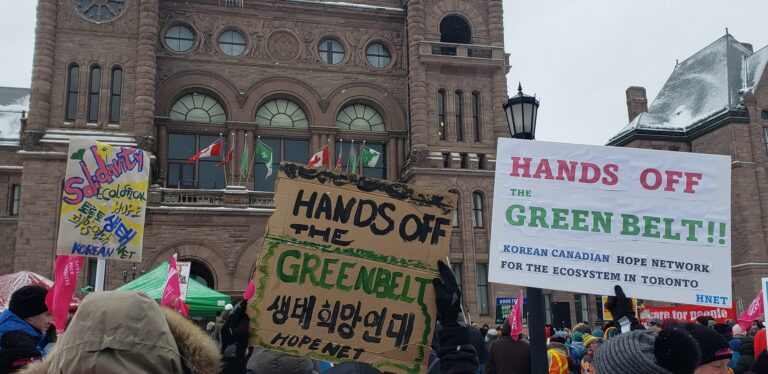
‘탈탄소 경제’ 위한 기술 이미 충분
기후위기 극복 기술, 고르기만 하면 된다
지난 주 눈폭풍이 지나가긴 했으나 그 어느 해 보다 따뜻한 겨울을 보내는 토론토에서도 지구 기온 상승을 피부로 느끼는 한해였다. 그럼에도 시민들이 이를 막기위한 행동을 시작하는 것은 쉽지 않다. 지난주 칼럼에서는 한국의 대기과학자 조천호 박사가 기후위기를 외치며 활동하다 마침내 정치계로 뛰어들며 쓴 칼럼을 인용 기재했다. 아무리 외쳐도 정치인은 꿈쩍도 하지 않고 유권자도 당장 내 눈 앞의 이익이나 정파적 결정으로 대통령이나 정치인을 뽑는 행태는 바뀌지 않았기에 정당으로 뛰어든 것이다.
기후위기를 부정하는 도널드 트럼프가 미국 대선 레이스에서 앞서고 있다는 소식을 들으면 더욱 불안해 진다. 그는 지난번 대권을 잡았을 때 파리 기후협약을 탈퇴해 버렸기에 이제 몇 년 남지 않은 마지막 기회를 허무하게 날려버리지 않을까 염려된다.
반면 기후위기보다는 경제위기를 걱정하는 사람들이 더 많은 것 같다. 이들은 기후문제를 해결하려면 개발과 성장이 멈추고 비싼 에너지를 사용해야 하며 편리한 생활을 포기해야 하는 것으로 생각하며 반발하고 있다. 어느 정도 동의가 된다. 그 동안 지구촌은 석유를 기반으로 하는 탄소 경제였다. 이산화탄소를 뿜어내며 전기를 만들고 플라스틱 등 제조업을 일으켰고 엄청난 양의 육축으로 소비자의 식탁을 채웠다. 이런 경제시스템은 탄소배출을 하지 않고는 유지될 수 없었다. 이러니 2030년까지 탄소배출을 절반 가까이 줄이려면 일자리 감소와 경제 성장 후퇴를 겪을 가능성이 크다.
그렇다고 지금까지 그랬듯이 탄소 경제를 이어갈 수 없음은 또한 너무나 분명하다. 이대로 탄소를 뿜어내면 2030년엔 평균기온이 산업혁명 이전보다 1.5도를 넘어가고 2050년엔 2도를 넘어갈지 모른다. 그러면 인류는 자신 뿐 아니라 지구상 생명종의 절반 이상을 멸절로 몰아가게 될 것이기 때문이다. 안락한 탄소경제도 유지하고 제6의 대멸절도 막을 수 있다면 얼마나 좋을까.
그러나 좋은 게 있으면 나쁜 것도 있는 것이 세상의 이치다. 그 동안 좋은 것들을 누렸다면 이제는 좀 절제하고 줄이지 않으면 대멸절을 받아들여야 한다. 그러니 인류가 지금까지 그래 왔듯이 제3의 길을 찾아야 한다. 탈탄소 사회, 탈탄소 경제가 불가능한 것은 아니다. 오히려 지금까지 개발돼 온 기술을 모으고 시민들의 집단 지성을 이용하면 커다란 충격 없이 탈탄소 사회로 옮겨갈 수 있다. 이미 모든 기술과 방안은 마련돼 있는데 정치인과 기업들이 이를 기꺼이 받아들이지 않고있다. 정치인을 움직이는 것은 시민들의 투표권이고 기업을 움직이는 것은 탈탄소 소비 행동이니 결국 시민들이 이를 바꿔야 한다.
몇가지 예를 들어보자. 가장 중요한 전력 생산에서 이미 태양광과 풍력은 가장 저렴한 전기가 되었다. 약점인 간헐성을 극복하기 위해서는 국가와 주를 넘나드는 전력망을 구축해 흐리고 바람 없는 지역으로 맑고 바람 많은 곳에서 생산되는 전력을 주고 받으면 된다. 수력도 추가로 건설하고 양수발전소도 더 많이 지어야 한다. 가정과 산업체에도 저렴한 발전 및 충전 시설을 갖추도록 지원하면 큰 비용 없이 전력을 생산할 수 있다.
육류 소비도 식물성으로 만드는 대체육을 더욱 활성화 시키고 대신 목축의 탄소세를 부과해 그 세금으로 지원한다면 얼마든지 소고기와 거의 구별할 수 없는 식물고기를 먹을 수 있는 세상이다. 자동차와 고속도로 건설 대신 대중교통을 확충하고 비행기 대신 철도망을 촘촘하게 깔아 유럽처럼 철도 여행을 편하게 할 수 있도록 정책을 펴면 된다. 석유화학 등 고탄소 산업 종사자들에게는 재생에너지 산업이나 생태 산업으로 직업 전환을 할 수 있도록 충분한 교육의 기회를 제공하고, 나무를 베는 직업 대신 나무를 심고 가꾸는 직업으로 바꾸도록 돕는 등 다양한 시민들의 지혜를 모으면 커다란 경제적 충격 없이 탈탄소 사회, 탈탄소 경제를 만들 수 있을 것이다.
We already have the technology for a ‘decarbonized economy’
Beating The Climate Crisis, It’s Just a Matter Of Choice.
Even in Toronto, where last week’s snowstorm ended a warmer-than-usual winter, we’re feeling the effects of rising global temperatures, but it’s not easy for citizens to start taking action to stop it. In last week’s column, I quoted a column written by Dr. Cheon Ho Cho, a South Korean atmospheric scientist who went from screaming about the climate crisis to finally entering politics. He jumped into politics because no matter how much he screamed, politicians didn’t budge and voters didn’t change their behavior of electing presidents and politicians based on immediate interests or partisan decisions.
It’s even more disturbing to hear that climate crisis denier Donald Trump is leading in the US presidential race. He pulled out of the Paris Climate Agreement the last time he was in the White House, so I’m worried that he’s going to squander the last chance he has in a few years.
On the other hand, many people are more worried about the economic crisis than the climate crisis. They believe that solving the climate problem will require us to stop development and growth, use more expensive energy, and give up our comfortable lives. To some extent, I agree. The world has been a carbon economy based on fossil fuels. It spewed out carbon dioxide to generate electricity, manufacture plastics and other products, and feed consumers with tons of meat. This economic system could not be sustained without carbon emissions. As such, reducing emissions by nearly half by 2030 is likely to mean job losses and a slowdown in economic growth.
But it is also clear that we cannot continue to run a carbon economy as we have been. If we keep pumping out carbon at this rate, we’re on track to exceed 1.5 degrees Celsius above pre-industrial temperatures by 2030 and 2 degrees Celsius by 2050, and we’re on track to drive not only ourselves but more than half of the planet’s species to extinction. It would be great if we could maintain a comfortable carbon economy and prevent the Sixth Great Extinction.
But with every good thing comes a bad thing. If we have been enjoying the good things in life, we will have to cut back and reduce them, or we will have to accept the apocalypse. Therefore, we need to find a third way, as humanity has done so far. A decarbonized society and a decarbonized economy are not impossible. On the contrary, we can move to a decarbonized society without much of a shock if we pool the technologies that have been developed so far and harness the collective intelligence of citizens. All the technologies and measures are already in place, it’s just that politicians and industries aren’t willing to embrace them. What drives politicians is the power of the vote and what drives companies is decarbonized consumption behavior, so it’s up to citizens to change that.
Let’s take a few examples. Solar and wind are already the cheapest sources of electricity where it matters most. To overcome their weakness, intermittency, we need to build grids that cross countries and states, allowing cloudy, windless areas to receive and send power from sunny, windy places. We need to build more hydropower and more pumped storage power plants. Households and industries can also be equipped with affordable generation and charging facilities to generate power without breaking the bank.
We could eat more plant-based alternatives to meat, and we could have a world where plant-based meat is indistinguishable from beef, if we imposed a carbon tax on livestock farming and funded it. Instead of building more cars and highways, we could expand public transit, and instead of airplanes, we could build a dense rail network and make rail travel as easy as it is in Europe. We can create a decarbonized society and a decarbonized economy without major economic shocks by collecting the wisdom of various citizens, such as providing sufficient training opportunities for workers in high-carbon industries such as petrochemicals to switch to renewable energy or ecological industries, and helping them to plant and maintain forests instead of cutting down trees.
